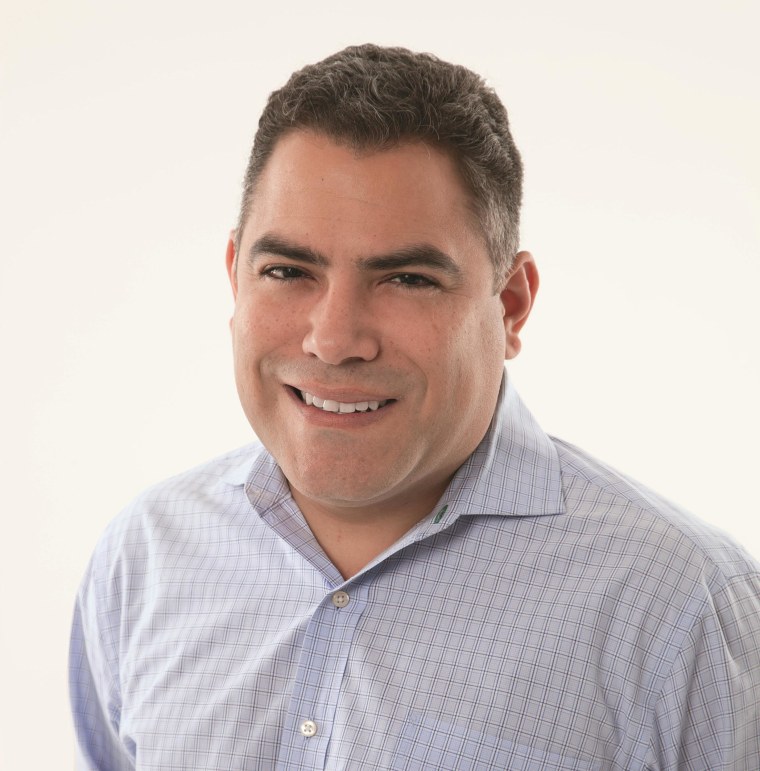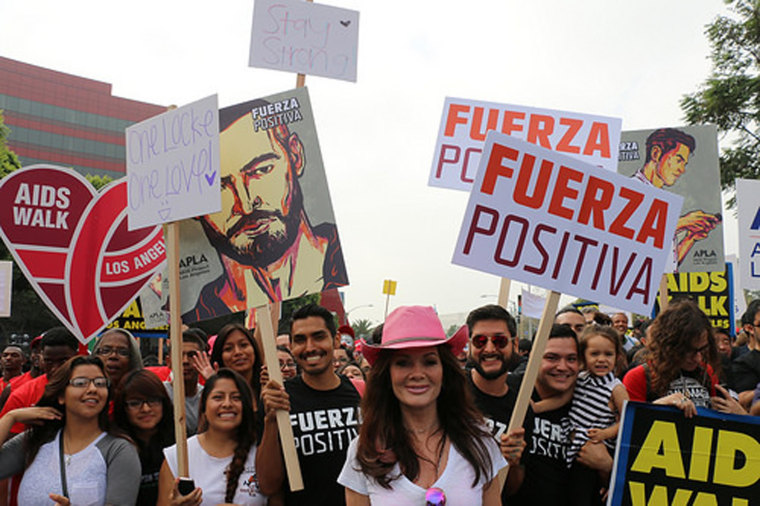In 1992, Oriol Gutierrez Jr. was 22 years old, conflicted about his sexual orientation, and serving in the U.S. Marine Corps Reserve. Thanks to the mandatory HIV testing for marines, one day his commanding officer brought him a message. Reading from a script, the officer informed Gutierrez that he had tested positive for the AIDS virus.
Gutierrez was stunned. “It is always a shock to hear a diagnosis of anything that is potentially fatal,” he said. “Being informed of my diagnosis by my superior officer was not easy, though it was handled sensitively. It was surprisingly tactful.” Overwhelmed, Gutierrez hid his HIV status from his family, who did not even know that he was gay. “It was a sad situation. I thought the best thing to do was separate myself from my family and strike out on my own… and wait to die.”
Today Gutierrez, 44, is healthy, partnered, and completely “out” to his family. He serves as the editor-in-chief of two online publications, Poz Magazine, aimed at people affected by AIDS, and Tu Salud, a guide to Latino health.

“Telling someone that you have HIV is similar to telling someone that you are gay,” he said. “It is like ‘coming out’ all over again. You are telling people something that they might not want to accept. There is tremendous fear and anxiety. Yet the process can be very empowering.”
December 1st marks the 26th annual World AIDS Day, a day for international unity in the fight against the disease and for commemoration of those who have died. Here at home Gutierrez, researchers, and community organizers are redoubling their efforts to ensure that Hispanics and other Americans live long, healthy lives.
Hispanics are 17 percent of the U.S. population, but they account for about 1 in 5 of people living with HIV.
The Center for Disease Control (CDC) reports that Latinos are disproportionately affected by HIV/AIDS. While Hispanics are about 17 percent of the population, they account for 20 percent of people living with HIV. The rate of new HIV infections among Latino men is almost three times that of white men. The rate of new infections among Latinas is more than four times that of white women.
“Approximately one in 50 Hispanics will be diagnosed with HIV in their lifetime,” said Dr. Donna McCree, Associate Director for Health Equity, Division of HIV/AIDS Prevention at the CDC. She cited socio-economic factors, language barriers and the stigma associated with the disease as reasons why Latinos over-index for HIV/AIDS.
Dr. McCree stressed that it is important for all people to know their HIV status. “Once you know your status then you can get care and treatment if necessary, get your viral load under control and prevent transmissions.” To help reach the Latino community, the CDC recently rolled out the “One Conversation At A Time” campaign, to promote more open discussions of HIV prevention and treatment.
“Unfortunately one of the biggest problems we have is getting past the machismo mentality and shame,” said Guillermo Chacon, president of the Latino Commission on AIDS. “Overall in Hispanic culture, discussing sexuality is very taboo, and even more so for sexual orientation. The battle is to break through these ideas and raise awareness.” Many people may not realize, he noted, that low-income documented and undocumented immigrants living with HIV are eligible for health and support services under the Ryan White Act.
The diversity of the Hispanic community poses challenges for those who are fighting the disease. “There are significant regional differences in the burden of HIV among Latinos around the country,” Chacon said. For example, the HIV diagnosis rate among Latinos in the northeast is more than twice that of any other region in the country. Latinos in the northeast are also more likely than those in other regions to contract the virus through intravenous drug use.
There are significant regional differences when it comes to Latinos and HIV diagnosis rates.
Although medication and new treatments help people with HIV live normal lives, too few Latinos are accessing the care that they need. One CDC study found that just over half of Latinos who were diagnosed with HIV stayed in treatment.
“Our Fuerza Positiva program is designed to break barriers and help reach those people who are out of care,” said Elvis Rosales of AIDS Project Los Angeles. We are out in the community, and we are recruiting allies to help spread our message.” Fuerza Positiva has recruited everyone from members of a gay soccer team to “Real Housewives” star Lisa Vanderpump to help with their Hispanic outreach.

Kalyani Sanchez, Assistant Director at the David Geffen Center for HIV Testing and Health Education in New York City notes that it is important to engage with young people when they have questions about HIV/AIDS. “Once they start asking questions, we need to answer them. If we don't answer their questions, someone else will.” He has a message for anyone wondering about their HIV status. “In order to be healthy you need to know what is going on. And the sooner you find out your status, the longer you live.”
Sanchez is realistic yet optimistic about the future. “I don’t want to sugarcoat things, but I do think about a world without AIDS. I want kids in the future to live their lives not worrying about HIV.” He points to “PrEP” – a way for people without HIV to prevent infection by taking a pill every day – as a significant biomedical advance.
Oriol Gutierrez Jr. hopes that anyone who is newly-diagnosed with HIV will realize that it is no longer a death sentence. “If you get treatment, you can have HIV and still have a normal life span. For anyone who is newly diagnosed, you have to take a deep breath and know that there is hope and that you are not alone.”
“I never could have imagined my life now, back then (when I was diagnosed),” he said. “And the fact is, the research and science are moving in the right direction. In my heart of hearts I am optimistic that we will see a vaccine or cure in my lifetime.”